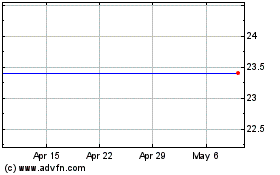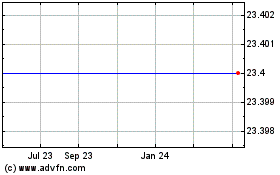Valeant Strikes Psoriasis-Drug Pact With AstraZeneca -- Update
September 01 2015 - 9:58AM
Dow Jones News
By Denise Roland
Canada's Valeant Pharmaceuticals International Inc. has struck a
deal with AstraZeneca PLC for the rights to sell psoriasis
treatment brodalumab after Amgen Inc. dropped its own collaboration
with the U.K.-based drug maker over concerns about the drug's side
effects.
Valeant said on Tuesday that it will pay AstraZeneca $100
million upfront, with another $170 million in prelaunch milestones
and up to $175 million following launch. Valeant and Astra will
also share profits on sales of the drug.
Under the deal, Valeant, which already has a large portfolio of
dermatology drugs, said it would assume all development costs
associated with the regulatory approval for brodalumab. It plans to
submit the drug for regulatory approval in the U.S. and EU in the
fourth quarter of 2015.
The Canada-based company will hold the exclusive rights to
develop and commercialize brodalumab globally, except in Japan and
certain other Asian countries where rights are held by Kyowa Hakko
Kirin Co. under a prior arrangement with Amgen, which first
developed brodalumab.
Amgen pulled out of its own collaboration with AstraZeneca in
May. The company cited "events of suicidal ideation and behavior"
during clinical trials of brodalumab. The U.S. biotechnology
company said these events would lead to restrictive labeling.
At the time, Astra said it would stick with the drug, pointing
to positive phase-three trial data.
Astra Chief Executive Pascal Soriot said the new agreement with
Valeant would "help to bring brodalumab to patients with psoriasis
who need new treatment options through Valeant's expert focus on
dermatology."
Brodalumab is "potentially the most efficacious therapy yet for
moderate-to-severe plaque psoriasis," said J. Michael Pearson,
Valeant Chairman and CEO.
However, analysts have cautioned that brodalumab may struggle to
win market share if approved due to concerns that it could cause
suicidal ideation.
"Physician feedback suggests brodalumab now has no future, even
if there turns out to be no link [with suicidal thoughts], given
the importance of safety with these drugs and the number of
alternatives available," said Deutsche Bank analysts in a note
published Tuesday.
Brodalumab, if approved, will compete directly with Novartis'
Cosentyx, which launched earlier this year. Both drugs are
antibodies that target a protein known as IL-17, using slightly
different mechanisms. Lilly is also developing an IL-17 antibody,
called ixekizumab, which it submitted to regulators earlier this
year. Neither Cosentyx nor ixekizumab have been associated with
suicidal ideation.
According to estimates by Deutsche Bank, the market for
psoriasis treatments could grow to $14 billion by 2023, compared
with $9 billion in 2014, though it expects brodalumab to generate
only "minor sales."
Psoriasis is an autoimmune disease that causes a red, scaly rash
and flaky skin. It affects around 7.5 million Americans, with
around a quarter of these suffering from the moderate-to-severe
form of the disease, according to the National Psoriasis
Foundation, a nonprofit organization.
Write to Denise Roland at Denise.Roland@wsj.com
Subscribe to WSJ: http://online.wsj.com?mod=djnwires
(END) Dow Jones Newswires
September 01, 2015 09:43 ET (13:43 GMT)
Copyright (c) 2015 Dow Jones & Company, Inc.
Valeant Pharma (NYSE:VRX)
Historical Stock Chart
From Mar 2024 to Apr 2024

Valeant Pharma (NYSE:VRX)
Historical Stock Chart
From Apr 2023 to Apr 2024
